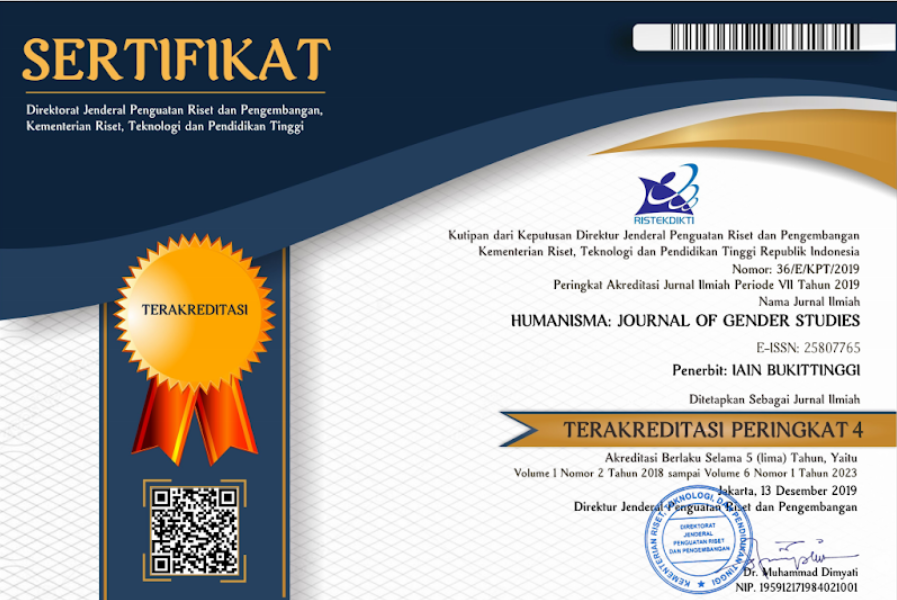Part of Material Opression: A Study On Romanticism and Stigma of The Role of Housewives and Working Mothers
DOI:
https://doi.org/10.30983/humanisme.v5i2.4710Keywords:
Feminism, Motherhood, Romanticism, Stigma,Abstract
This study aims to determine the romanticism of the mother's role and the stigma housewives, and working mothers receive. Romance towards the role of the mother often has an unfavorable impact on the mother's condition. Besides romance, stigma is also born and accepted by housewives and working mothers. The stigma continues and impacts the condition and vulnerability of a mother. This research is descriptive qualitative research and analyzed by feminist theory about mothers. The study results stated that the romanticism of the mother's role affected the workload received. This study opens a view about the need for efforts to solve the problem of romanticism in the role of mothers. It is necessary because it is helpful to prevent the occurrence of adverse effects on the condition of the mother's vulnerability. This study also found four stigmas received by working mothers and housewive such as Bachelors who only become full-time mothers, housewives: working spends husband's money, working mothers: never have time to educate children, working mothers: children are entrusted to grandmother, be a grandma's child, housewive are clumsy. Housewive enjoy life because they relax, career women like hanging out, and working mothers have minimal knowledge of kitchen and parenting matters. The two points above are important points that became the findings in this study. housewife: work spends husband's money, working mother: never has time to educate children, working mother: grandmother leaves children, be grandma's child, housewive are clumsy. Housewive enjoy life because they relax, career women like hanging out, and working mothers have minimal knowledge of kitchen and parenting matters. The two points above are important points that became the findings of this study.
Â
Penelitian ini memiliki tujuan guna mengetahui romantisme peran ibu dan stigma yang diterima oleh ibu rumah tangga dan ibu bekerja. Romantisme terhadap peran ibu sering memberikan dampak yang kurang baik terhadap kondisi ibu. Selain romantisme, Stigma juga lahir dan diterima oleh ibu rumah tangga dan ibu yang bekerja. Stigma tersebut terus diproduksi dan memberikan dampak terhadap kondisi dan kerentanan seorang ibu. Penelitian ini adalah penelitian deskriptif kualitatif, dan dianalisis dengan teori feminis tentang ibu. Hasil penelitian menyatakan bahwa romantisme peran ibu memberikan efek terhadap beban kerja yang diterima. Penelitian ini membuka pandangan mengenai perlunya upaya-upaya yang bisa menyelesaikan persoalan mengenai romantisme terhadap peran ibu. Hal tersebut diperlukan, sebab berguna untuk menghambat terjadinya dampak buruk terhadap kondisi kerentanan ibu. Penelitian ini juga menemukan empat stigma yang diterima ibu bekerja dan ibu rumah tangga seperti:Â Sarjana kok yang hanya menjadi fulltime mom, ibu rumah tangga: bekerja menghabiskan uang suami, ibu bekerja:Â tidak pernah memiliki waktu untuk mendidik anak, ibu bekerja: anak dititipkan nenek, jadilah anak nenek, ibu rumah tangga itu kucel. Ibu rumah tangga enak hidupnya karena hanya santai-santai, wanita karir emang hobinya nongkrong, dan ibu bekerja memiliki pengetahuan yang minim terhadap urusan dapur dan pengasuhan. Dua poin diatas menjadi poin penting yang menjadi temuan dalam penelitian ini.
References
Journal;
Davies, Linda, Sara Collings, dan Julia Krane. “Making Mother Visible: Implicaton for Social Work Practice and Education in Child Welfare.†Journal ofthe Association for Research on Mothering, 2, 5 (2003): 159–67.
Elanda, Yelly. “The Construction of An Ideal Mother Amid the Covid 19 Pandemic: Gender Injustice Experienced by Career Women While Working From Home.â€Journal of Gender Studies 05, no. 01 (2021): 16.
Fitri, Wanda. “Perempuan dan Perilaku Kriminalitas: Studi Kritis Peran Stigma Sosial Pada Kasus Residivis Perempuan.†Kafa`ah: Journal of Gender Studies 7, no. 1 (22 Juni 2017): 67. https://doi.org/10.15548/jk.v7i1.155.
Limilia, Putri, dan Ditha Prasanti. “Representasi Ibu Bekerja vs Ibu Rumah Tangga di Media Online: Analisis Wacana pada Situs Kompasiana.Com.†Kafa`ah: Journal of Gender Studies 6, no. 2 (31 Desember 2016): 133. https://doi.org/10.15548/jk.v6i2.140.
McLaren, Helen Jaqueline, Karen Rosalind Wong, Kieu Nga Nguyen, dan Komalee Nadeeka Damayanthi Mahamadachchi. “Covid-19 and Women Triple Burden: Vignetters From Srilangka, Malaysia, Vietnam and Australia.†Journal Social Science 9 (27 April 2020).
Tuwu, Darmin. “Peran Pekerja Perempuan dalam Mememnuhi Ekonomi Keluarga: dari Peran Domestik Menuju Sektor Publik.†Al-Izzah: Jurnal Hasil-Hasil Penelitian 13, no. 1 (30 Mei 2018): 63. https://doi.org/10.31332/ai.v13i1.872.
Wicaksono, M Arief. “Ibuisme Masa Kini: Suatu Etnografi tentang Posyandu dan Ibu Rumah Tangga.†Indonesian Journal of Anthropology 1 (2016): 13.
Books;
Dadang Hawari. Manajemen Stress Cemas dan Depresi. Jakarta: Balai Penerbitan FKUI, 2001.
Erving Goffman. Stigma: Notes on The Management of Spoiled Identity. America: Prentice Hall, 1963.
Junaidi, Heri. “Ibu Rumah Tangga: Streotype Perempuan Pengangguran†12 (2017): 12.
Kenanga (Nama Samaran). Wawancara tentang Peran Sebagai Ibu, 11 Juli 2021.
Klasselmen dan Amy. Women Image and Realities, A Multicultural Anthology, Second Edition. California: Mayfield Publishing Company, 1999.
Muhammad Idrus. Metode Penelitian Ilmu-ilmu Sosial: Pendekatan Kualitatif dan Kuantitaif. Yogyakarta: UII Press, 2007.
Nuzula, Kartika Firda. “Perancangan Kampanye Mengurangi Stigma terhadap Ibu Tunggal.†Skripsi, Universitas Sebelas November, 2021.
Qodir, Faqihuddin Abdul. Qiraah Mubadalah. Yogyakarta: IRCiSoD, 2019.
Rahman, Alif Fathur. “Motivasi, Stigma dan Coping Stigma pada Perempuan Bercadar,†2017, 13.
Other’s;
Anggrek (Nama Samaran). Wawancara tentang Peran Sebagai Ibu. Chat WhatsApp, 11 Juli 2021.
Bunga (Nama Samaran). Wawancara tentang Peran sebagai Ibu. Chat WhatsApp, 28 Juni 2021.
Matahari (Nama Samaran). Wawancara tentang Peran Sebagai Ibu. Chat WhatsApp, 11 Juni 2021.
Mawar (Nama Samaran). Wawancara tentang Peran Sebagai Ibu, 27 Juni 2021.
Melati (Nama Samaran). Wawancara tentang Peran sebagai Ibu, 28 Juni 2021.
Downloads
Submitted
Accepted
Published
Issue
Section
License
Authors who publish with this journal agree to the following terms:
- Authors retain copyright and grant the journal right of first publication with the work simultaneously licensed under a Creative Commons Attribution-ShareAlike 4.0. that allows others to share the work with an acknowledgment of the work's authorship and initial publication in this journal.
- Authors are able to enter into separate, additional contractual arrangements for the non-exclusive distribution of the journal's published version of the work (e.g., post it to an institutional repository or publish it in a book), with an acknowledgment of its initial publication in this journal.
- Authors are permitted and encouraged to post their work online (e.g., in institutional repositories or on their website) prior to and during the submission process, as it can lead to productive exchanges, as well as earlier and greater citation of published work (See The Effect of Open Access).



















